Mutual Aid in the ‘Risuo Space’, Livorno, Tuscany
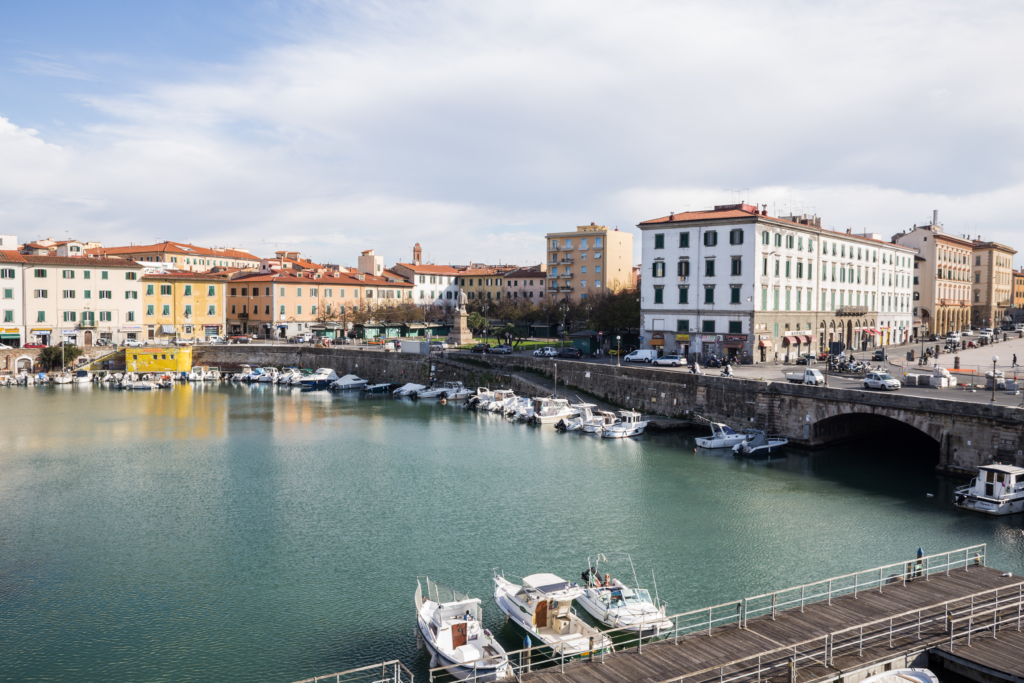
A view of the popular district “Garibaldi” in Livorno, Italy where “La Riuso” space is located. In the last 20 years several migrant communities have arrived in the neighborhood
We explore how people have been responding to the crisis on the ground, across Europe, creating community and fostering solidarity. In this photo essay Giacomo Sini & Dario Antonelli report from the anti-racist/anti-fascist city Livorno in Tuscan where the “Riuso Space” within the Garibaldi district has become a meeting place where people from different origins and generations give life to after-school projects, craft workshops and foster a circular economy. The most ambitious project is “Riconoscersi Solidali”, unique in the whole country. Here young migrants, asylum seekers and elderly people from Livorno meet for to help each other with shopping, learn a language and get to know each other.
Standing in the sun, Maty has under her arms some personal files, the blue mask does not contain her smile. Alba takes her elbow “Livorno has always been welcoming to everyone, it didn’t even have a ghetto, but now there are those who would like to be racists here too! The two start walking again, slowly crossing the square, right behind a Garibaldi’s statue, who is looking towards the industrial port from its base.
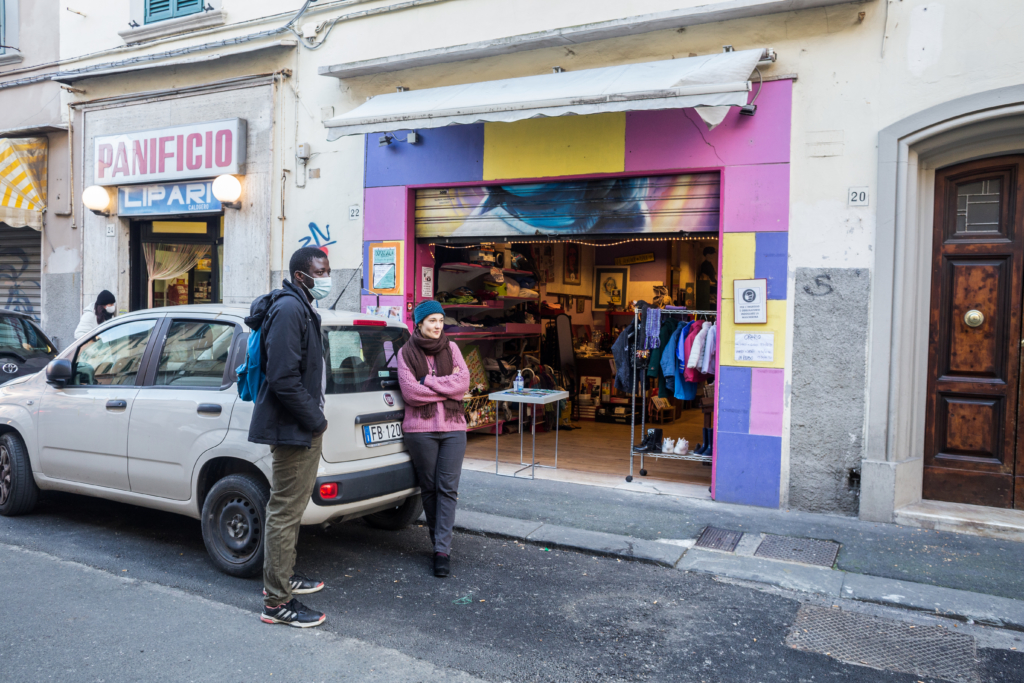
In front of the space “La Riuso”, Lansseny, 22 years old Malian and Chiara, 31 years old from Livorno, await the arrival of other volunteers to start the daily activities of the association “Mezclar 22”.
Behind the square there are the narrow and crowded streets of the historic Garibaldi district where La Riuso is located, a space that since 2017 distributes clothes, books, games and other send hand objects, as well as promoting various projects aimed at the inhabitants of the area. It is here, in the small cloister that opens in the center of an old building, that Alba, over eighty years old from Livorno, and Maty, twenty-six years old from Senegal, meet among plants and piles of books.
A first meeting to start a new chapter of the project “Riconoscersi solidali” that Mezclar22, the association that manages the projects of La Riuso, has started together with CESDI – The Immigrant Women’s Service Center thanks to the funding of the Waldensian Church. The main focus of this project is the meeting between young immigrants and elderly people of the neighborhood who are interested in participating.
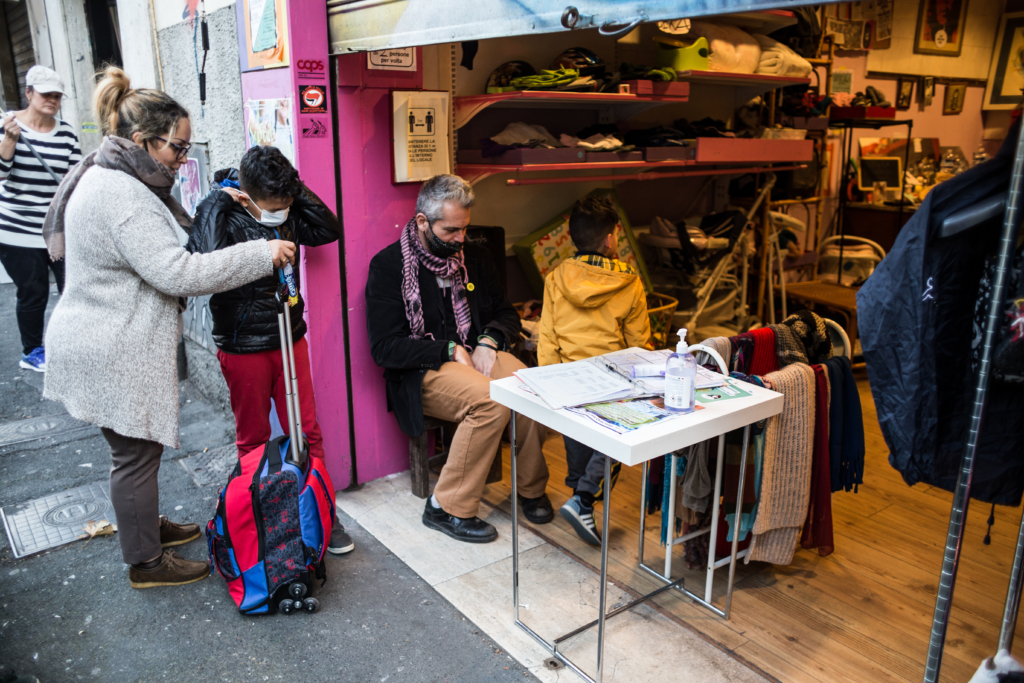
Amin and Omar, born in Tuscany and of Moroccan origin while they are about to enter “La Riuso” space to carry out the after school activities. At the center of the photo, Filippo, one of the main animators of the space and its activities.
Maty has been living in Italy for 5 years “I studied, I would have liked to enroll in university, but then I had my first child, and I could not continue”. She still has difficulties with Italian, and dealing with older people is not easy, but she chose to undertake the project to improve the language and have a small income.
“The project started just before the pandemic” says Filippo, one of the main animators of La Riuso and tutor of the volunteers ,“when the lockdown took place in March we stopped the Italian courses and we could only finish them in the summer”.
In September, after training, finally “Riconoscersi solidali” got going: young people started to go knocking the door of some old people’s to help out and have a chat, others went out together to buy food or for a walk, someone else needed the delivery of groceries; an opportunity to get to know each other. Indeed The project “aims at the development of social and working inclusion of migrants and asylum seekers and mutual solidarity with the elderly of the Garibaldi neighborhood,” explains Veruska, president of the association. Unfortunately after October the situation has changed. Compared to last spring, covid-19 overwhelmed the city, the health risk and restrictions at regional level have forced to radically review the project. “In this difficult situation many activities are impracticable – continues Veruska – and many people have given up participating for fear of contagion. Some pick up their shopping from the window, dropping a basket or a grocery bag on the street. Just in November, while Tuscany was declared high risk “red zone”, the activities of delivery of groceries and medicines continued with the necessary precautions. In this case the project has been a real resource for many. It allowed to break the isolation to those who were forced into an impossible confinement in the dormitories of a reception center or in the solitude of an old house.
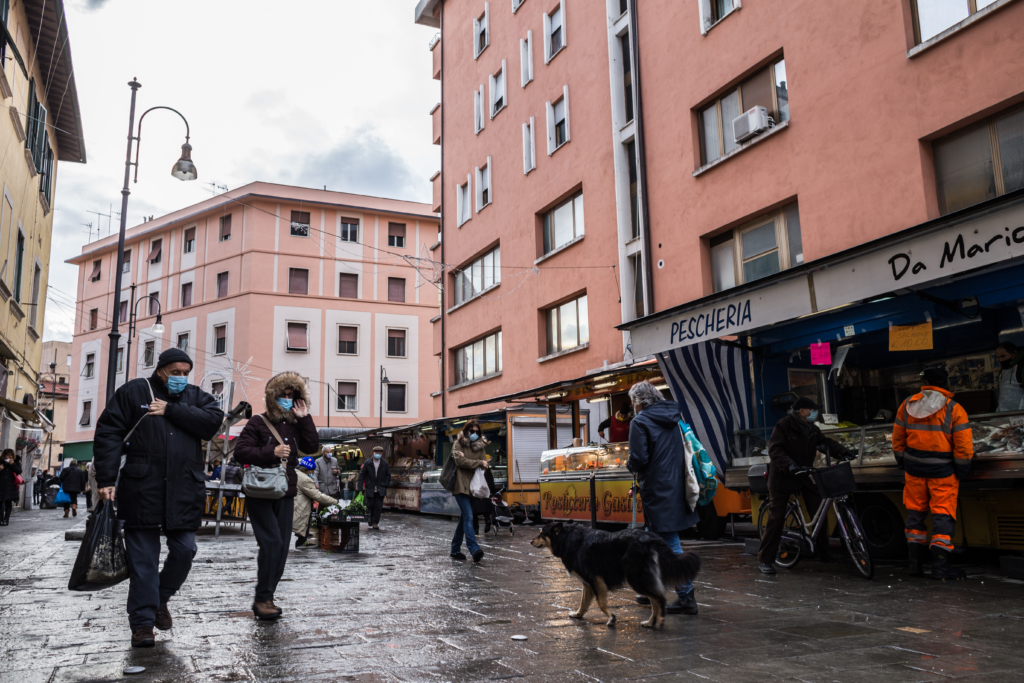
The Market of Piazza Cavallotti in the center of Livorno. The volunteers of “La Riuso” space buy here the food for the free hopping aid activity provided to the elderly of the area around the Garibaldi district, as part of the project “Riconoscersi solidali”.
In September, Seydou, a twenty-seven-year-old from Senegal, started meeting with Grazia, who lives a stone’s throw from La Riuso. They were shopping together in one of the neighborhood grocery stores. Then, with the resumption of contagion and the first restrictions, Grazia stopped going out of the house. Her daughter, who is employed in a bar and cannot work during this period, is now helping her with shopping. Seydou often passes under her window overlooking the Piazza dei Mille, exchanging a few jokes, trying to maintain the relationship that had been created. Even before the project Seydou frequented La Riuso. He set up a small tailoring workshop in the cloister where there are a couple of sewing machines and a bunch of scraps on the coffee table under the porch. “I studied for eight years, but here I can’t find a job as a tailor”, says while pulling out of a drawer a yellow cotton spool, “I could do small repairs at home, but this material costs money, and with what I earn by some works I couldn’t even buy it. This is not work”. Seydou tells that it is to escape unemployment that he left his home “it’s like that for everyone, and many die by trying to cross the Mediterranean sea”.
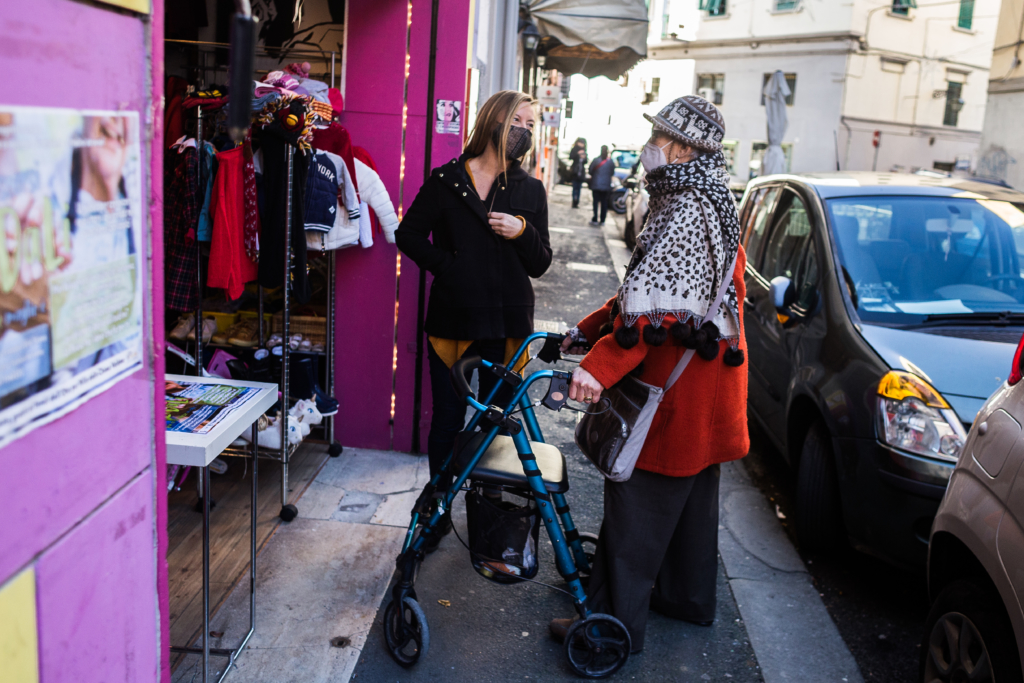
is committed to make “La Riuso” a meeting point between people who live in the Garibaldi district.
15. Veruska, president of the association “Mezclar 22” which is based at “La Riuso” space, meets Alba, over 80 years old from Livorno who lives nearby. Since the beginning of the project “Riconocersi solidali” Alba has participated in it supporting its activities.
By now he has been in Livorno for three years, he works for a service cooperative, a few hours of cleaning; he manages to integrate his income with the activities in La Riuso, but he would like to try to move to look for a job.
For this morning Lansseny has finished the deliveries, in the cloister coffee and warm focaccia have arrived. The guy explains that three times a week he makes deliveries of food and medicine, he is very active and has just started. He already has a close relationship with Piero, seventy-four years old, a true Leghorn native, forced to stay home by health problems. Lanssenny always walks up four flights of stairs for deliver him groceries but now unfortunately it is not possible to stay long to talk; they meet on the landing, at a safe distance, wearing masks. But this is also important. Piero often lends him a few books, novels, but also a volume for driving school, a vocabulary.
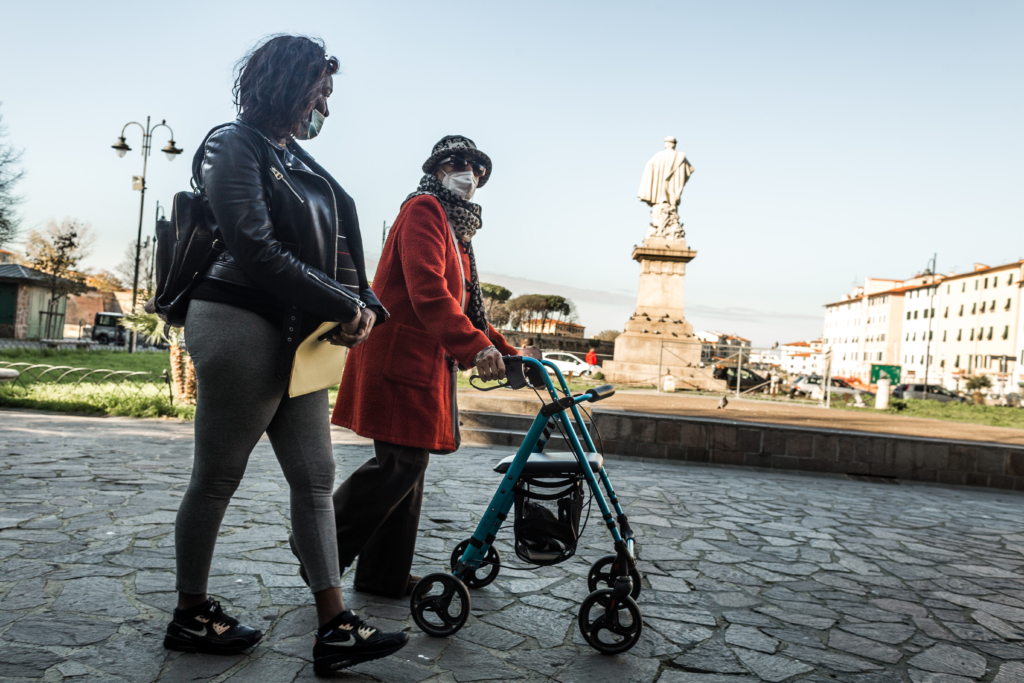
Alba, over 80 years old from Livorno, walks with Mati, 26 years old from Senegal in Piazza della Repubblica, right adjacent to the Garibaldi district. As part of the activities of the project “Riconoscersi solidali”.
In Livorno Lannseny is continuing to study, this year he would have liked to enroll in evening classes but prefers to wait for the end of the distance learning phase , “I would take the diploma, but I will not learn anything, I suppose”. Originally from northern Mali, Lannseny is twenty-two years old, three of whom lived in Livorno, where he intends to stay. To escape the destruction of the war and the forced recruitment in radical Islamist troops he decided to leave, he was stuck in Libya “only one year, it went well for me” tells with a smile, before he starts talking again. From Lampedusa he arrived directly here, in Livorno. It was night when he was sent to the Centro di Accoglienza Straordinaria – Extraordinary Reception Centres for those who are seeking international protection which was located between Garibaldi district and the train station: “As soon as I got off the bus I found Giulia, who told me – Come to school tomorrow morning! – ” The subsequent laughter is covered by the voice of Giulia who teases him “You talk too fast Lansseny! You want to say too many things and you eat words, old people don’t understand you!”.
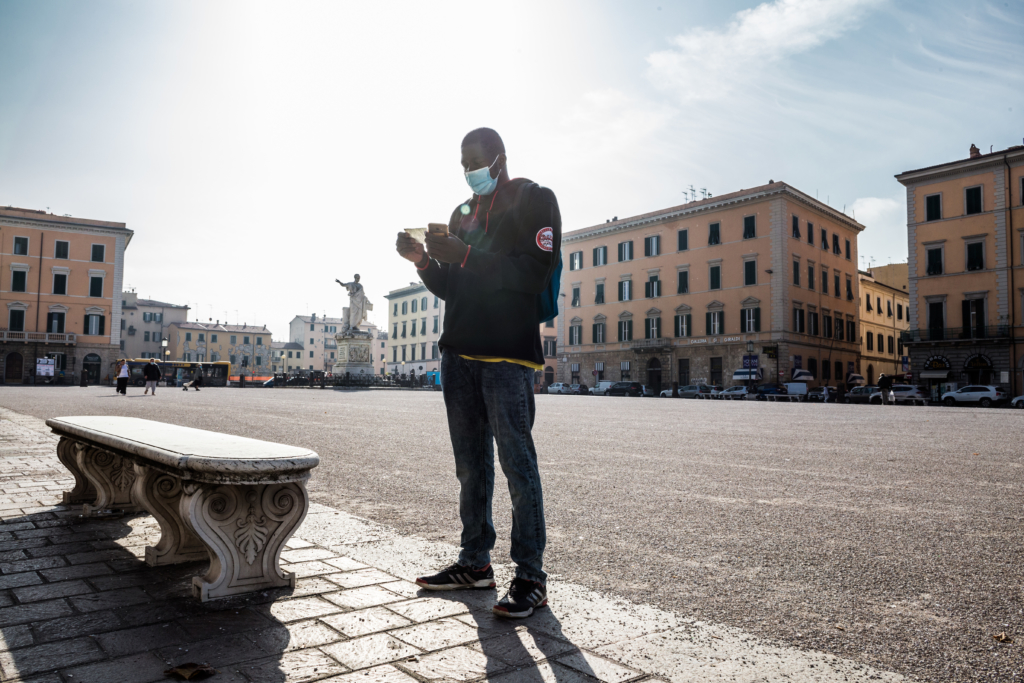
Lansseny, 22 years old from Mali and in Italy since 3 years, reads the shopping list before going to the market in Piazza Cavallotti and buying what Piero, seventy-four years old from Livorno, needs. Piero takes advantage of the shopping service offered by the “La Riuso” space.
Every afternoon in La Riuso there is space for after-school activities, with the participation of girls and boys from the neighborhood, many from families of foreign origin. At the beginning Giulia went to look for them directly in front of the schools, in the stores of the neighborhood, talking with teachers and parents. After more than two years the activity has grown, as well as the participants. Many other volunteers joined after school, Chiara, Martina, Ahmed, and each child was followed on an individual level, a real network was created.
La Riuso is above all a place of meeting, of aggregation, says Filippo “it is precisely those relationships that allow us to be a point of reference even in this difficult situation”. But in recent years the space has also been an observation point “a central reference in the heart of the neighborhood”, hence the idea of “breaking the barriers of generation and origin so visible in the neighborhood, organizing activities aimed at all inhabitants”.
But to understand the story of “Riconoscersi solidali” we must go back to the measures taken by the first Conte government signed by the former Minister of the Interior Salvini in 2018. “It all started there”, remembers Filippo, because – he says – the closure of the SPRAR – the System of Protection of Asylum Seekers and Refugees led the de facto to the elimination of humanitarian protection. This has resulted to the closure in 2019 of nine of the twelve Centro di Accoglienza Straordinaria – Extraordinary Reception Centres that were active in Livorno, but most of all to the end of many projects, activities, relationships; especially the elimination of all the future prospects for the people who lived in those centers.
Before returning for lunch at the Centro di Prima Accoglienza – Initial Reception Center/ former Centres For Accommodation Of Asylum Seekers where he now lives, in the nearby Venice district, Lansseny returns to La Riuso, shows his smartphone to Giulia “look – he says – they have accepted my request for as asylum!”.

We’re crowdfunding for our future. If you’d like to support us go here:
